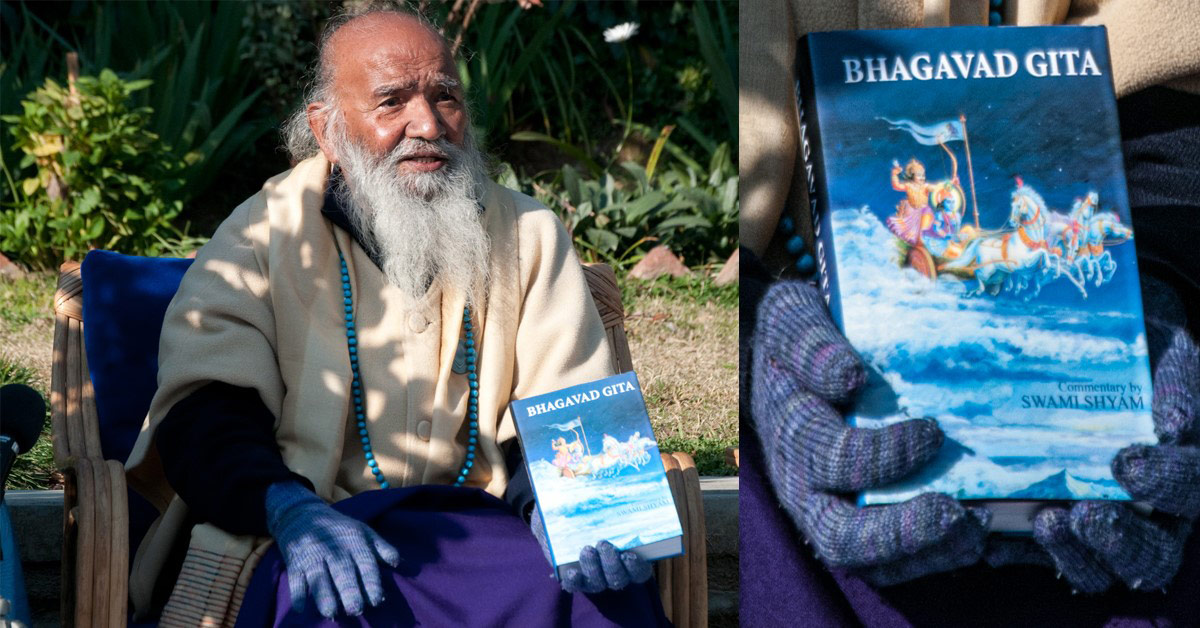Madhuri: In the first seven or eight verses of Chapter 8 of the Gita, there are slightly differing definitions, which simply means there are different perspectives on the same term. I wanted to ask you for clarification about them and their relationship with each other—such as Adhiyagya, adhidaiv, and adhyatma. How do they relate to each other and to the idea of Brahm?
Swamiji: We start from this side, the side of a human being. In the case of Arjun, he is the representative human being of all human beings, of humanity as a whole. He knows in his time what adhibhoot is. Adhibhoot is that which changes. Bhoot bhav (an element exists), or it happens, and later on it does not happen, it lives and then it unhappens—that is bhoot. So the word bhoot stands for the individual unit, which changes and is obvious, apparent, and known by Arjun, by people, by every person. His body is adhibhoot.
His ego-intellect-mind which changes is also adhibhoot. The inner side of his ego-intellect-mind is adhidaiv, which knows “I am.” It does not change and is, so it is divine existence. Divine means subtler than the subtlest, which the ego-intellect-mind will not reach—that is adhidaiv. The same awareness, but as consciousness, the human mind, or human knowledge, is adhibhoot awareness. This is the inner side being explained from the gross side. From the gross side a human being knows “I am this body.” What is that which knows the body? Jar (insentience) has no knowledge or consciousness with which to know. A person knows things are changing—leaves, flowers and fruit, a human being’s life and time in time and space, everything is changing. This is adhibhoot, which changes and dies. Adhidaiv is the inner self, which is not seen as dying or not dying, so it is called subtler than the subtlest.
Adhyatmik is the inner side, which is not seen at all and is. That is the space which the mind will never know, because the mind knows onwards from the antahakaran (inner instrumentality)—or the man (mind), chitt (lake of consciousness), buddhi (intellect), and ahankar (individual I-sense)—which functions. Before the antahakaran is the adhyatmik. The difference between that and bhautik (of the bhoot, or elements), which changes, is that the adhyatmik does not change. A human being knows this also, that there is something which is unchanging. This is adhayatma vidya (spiritual knowledge), or adhyatma purush, an adhyatma person, which you can translate as a spiritual being.
But before that, and when all three are done, it is all Knowledge. So from this side, the last is Adhiyagya. Adhiyagya is all beings, manifest and living, and those people who died. Adhiyagya is Krishna, the Self, Me, which is subtler than the subtlest, which means the ego-intellect-mind does not know it because that is only adhidaiv, which is inner, and adhibhoot, which is outer, or external. A human being knows everything external, he does not know internal. Some people are there who say that “The mind is, the intellect is, the ego is, so I am.” The one who knows “I am” and who knows that everybody is “I am,” that all the forms and objects know “I am,” he is generous, he is aware, he is universal, he does not divide. He knows “I am everyone.” Adhiyagya is described by Krishna himself as “I am that Adhiyagya.” Adhiyagya is the Source. The Source is no consciousness of a man, no existing existence, no knowledge of the existing forms of a man. So a man does not get Adhiyagya. Thus Krishna says, “All your knowledge—adhyatmik, adhidaivik, and adhibhautik—is based on the sense of duality as ego, or ahankar.” Ahankar is the kalpana, or imagination, of Krishna. It is a power of Krishna. When the power of Krishna is there, as long as Krishna is not associated with that power, which is prakriti (nature), till then he is Pure Consciousness, Shuddh Chaytan. But the moment he associates, then he forgets and becomes Arjun, he becomes a man, and he says, “I am this man.” Then each one says, “I am this person,” “I am that person.” Then each wants to know, “What is my Source?”
The Source is Krishna Consciousness. We began to say this. It is also not Krishna Consciousness—which says, “I am Krishna.” Krishna will never say, “I am Krishna.” He says, “Indestructible, unborn, unchanging,” to a human being, because a human being only knows destructible bhootas. Indestructible bhootas are those which are the inner being, the ego-intellect-mind; you cannot destroy them, they are there. In this way, you go from this side. It is your understanding that knows earth and water change and are destructible—all bhootas are. You know fire, that light and fire are also changing; air is also changing and dying, it is destructible; and sky, the sound, is also changing. All these five tattwas (elements, or earth, water, fire, air, space) are five bhootas. These five bhootas are based on the subtler bhootas of their own, which are called tanmatras [such as the tanmatra of space is sound]. Tanmatras are based on sattwagun, rajogun, tamogun (the powers of luminosity, activity and inertia), which are called the guna powers, which are manifesting them. All the tanmatras represent inner senses, and they work.
Krishna wants to say, “Surrender all of that to Me.” Madhuri asked what their relationship is. Relationship will be for a human being who thinks that the bhootas are there, so how are they related to the subtler bhootas? He answered, “Subtler bhootas are not obvious—this is their relation.” The subtlest is still there. But for Krishna, there is only one reality, which means there is no other space except That. That is advait, one without a second. There is neither Krishna nor Arjun. There is only Nirgun Nirakar Nirvikalp (beyond the gunas, form, and change). We lead the attention of a man like this, but he cannot reach there. At least he has some words and says, “Let me try and examine.”
Adhiyagya is you before you were born and before the world was born. What was that? The adhidaiv and adhyatma do not know. That was only Krishna. That too, we give the name Krishna. It is Absolute Bliss Consciousness, so they say it is Param Anand (Absolute Indivisibility) Param Satta (Absolute Existence), Param Consciousness, all these three states—because a man knows satta, consciousness, and anand. These are also deleted, and then they call it Param. Param is your true nature. If you know That, then all this is nothing but That. But this is changing, and That is indestructible. It does not change because it is not born, it is not apparent. That way, it always is.
When I say, “That is you, Pure Free Forever,” I am indicating your Source. A human being is such that he is conditioned, because of birth, with the upadhis (qualifications) which are the five tattwas, which he says are real. He can never accept the five tattwas were not there. So to him—if we know he can get it—we say, “Look, if the five tattwas were not there, why is your body there?” The man asks, “How shall I understand that?” The main problem with an intellectual, or with the ego-intellect-mind, is, “How should one know ‘I am That?’” So we keep saying, “You say, ‘I am this,’ therefore you are afraid this will not be and you will die. But I say, ‘No, no, your understanding is based on illusion, on your ego-intellect-mind. Its approach is only form, so you say ‘I am this.’ Maybe this is not the body, maybe it’s a sleepy body, but it is still ‘I am this.’” He answers, “In sleep, I am free. But in the dream and waking states, I am bound. In thinking, while seeing and hearing the varieties, I am bound.” Everywhere he is bound. Bound means he forgot. Why is he bound? Because he thinks he is this. This is not his own intellect or mind, it is not his knowledge. A child was not even born, so how can he say, “This is me”?
All human beings are born with bodies, so they are a body of the five tattwas, prakriti, or nature. They can understand this, because blood, bones and all those things which we talk of are there. A human being does not know what is being spoken to him by Guru because he thinks he is not Guru. He doesn’t want to accept what Guru says because he thinks, “Guru is a body and I am also body, so Guru is talking about that which I should know. I should know it, but I want to be this body and remain this body—and then I want to know Guru.”
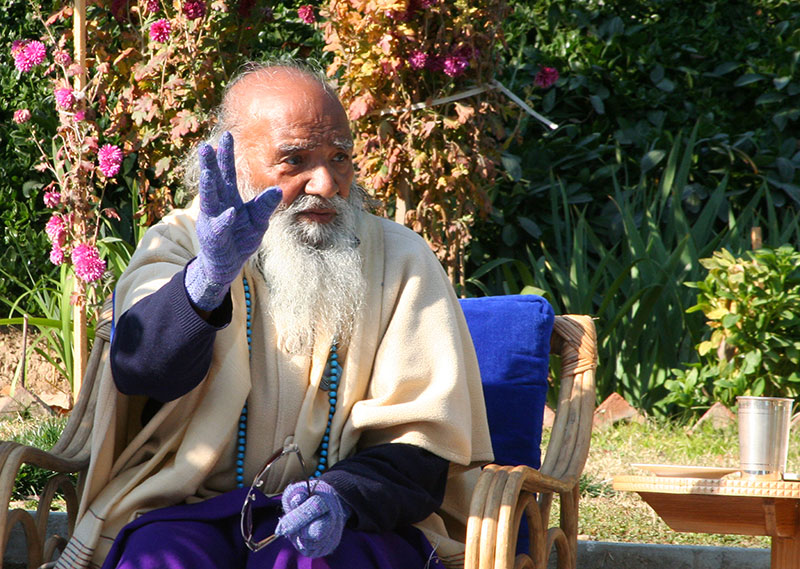
Guru is Krishna, which is the Space. Krishna sitting over there speaks to Arjun, “Look, surrender this ignorance, the ignorance of Me. You are Me.” He says, “You are Me. You are Self.” But Arjun, as the ego-intellect-mind, says, “Well, I am this body, and all my relations are all bodies, and if I shoot them they will die.” Krishna answers, “They were not even born. Why will they die? You were not even born, so you are non-doer. But you think you are the doer.” This is a very complicated affair, so all human beings dropped it. They think, “What is there to do?” So they became good scientists. They say, “Well, look, physical things are there, and as long as my body is there, I have to live this. When my body is not there, then however everything happens, it will happen.”
But it is not that way. Only in a body will you come to know the body was not. A man’s problem is, “Suppose I conclude the body was not, then what was I?” He again wants to have a form. So he says, “Was I a cow, an elephant, a butterfly, a dog, or a cat?” because he only sees this, and he’s completely fixed in it. In the dream he sees, so he says, “The dream comes because of the waking state.” In the waking state, he has seen this. A child does not see this. Why can you not believe in a child’s awareness? A child does not see division. He does not see the destructible or adhibhootas, the adhidaiv, adhyatmik, or Adhiyagya. He doesn’t see them because he is Pure Free Forever.
This is what we conclude. But you cannot conclude this. You say, “How is he Pure Free Forever? He is a body.” He is never a body. The body was never there. But if the body came, then he is there. So the Self alone is—the Self, Chidakash, Chinmatra, Chaytan (Consciousness), or Being. This is the language we can use, because otherwise it is maun (beyond speech). If you are maun and I am maun, then neither you study anything nor can I teach you anything: maun. If you remain maun, then whenever you are not maun the same mind is there. Maun means that Krishna where there is no division, no birth and no death, no change and no unchanging. All these words that mean indestructible are being said to a man who thinks that destructible is there, whereas it is beyond destructible and indestructible. That is Krishna.
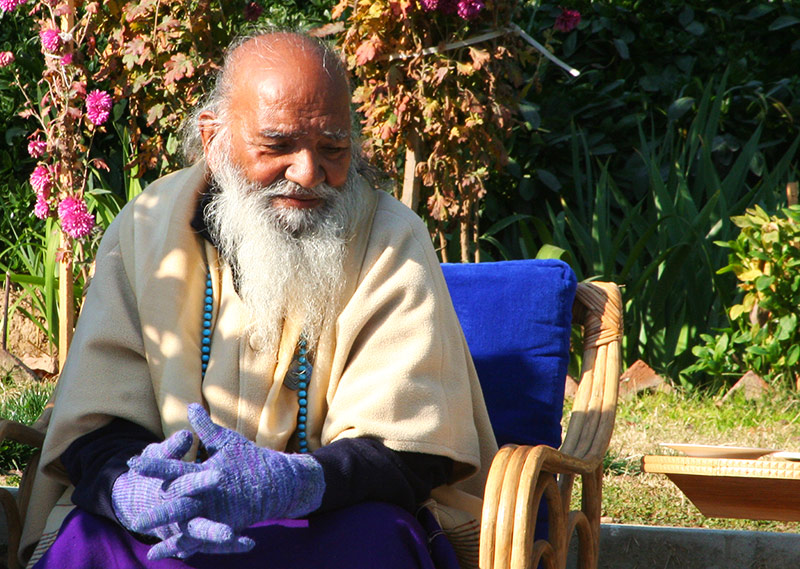
But to people who are not able to understand this we simply say, “Krishna is a form, so devote your time and have bhakti (devotion to him).” We say to have bhakti and faith because it is known that a human being is nothing but the same Awareness, so at least he will have some trust and faith and think, “Something will happen that I will be saved.” In this way, there are bhaktas (devotees)—here in India and elsewhere in other countries, they are all bhaktas. Why? They think God is and that God is separate from the bhakta. Again this is division, so it is not going to solve the problem. It is only oneness that will. I say “oneness,” and you think, “Ten or twenty persons should make a group and get together, then there is oneness.” Again, it is not. This is where Krishna says, “I am that which is indestructible, Akshar Brahm.” Arjun asks, “If you are Akshar Brahm, I also want to be Akshar Brahm.” Krishna is not even Akshar Brahm. That which you are is not destructible or indestructible, changing or unchanging. You are beyond both. Your human mind needs to transcend both, so Brahm is called beyond.
When you say beyond, the human mind thinks, “Beyond is the sky, the sky is something higher, and in this sky somebody is sitting over there who is knowing.” This is the human being to whom Krishna is speaking. He is not teaching himself, he is teaching Arjun. So we have to take the side of Arjun first, and identify with it. This is the relationship between them, if you say “relationship.” Otherwise, in Krishna there is no relationship—That alone is, the Self alone is. A man with a mind is struggling. He says, “Somehow, some relation should be there.” If we say Existence, then we say existing things die and that which does not die is your awareness. But this is a teaching device. It is not that you’re going to succeed in it, yet you grow in it. Your mind gets educated and you grow in knowing, “Yeah, changing things all die. If I think I am changing, then I’m not going to be free from fear.” At least you will come to know “I am unchanging.” But “I” is there for you, whereas in truth “I” is never there.
Then “I” is explained as how this world can come into existence. It comes into existence because of “I,” or ahankar. Ahankar belongs to the sankalp kalpana, or imagination, of that Being who is formless and nameless. So formless and nameless, nirakar, is some kind of space, which you are—so you can get to that. Then we say it is nirgun—without the gunas of prakriti, or sattwagun, rajogun, tamogun. Since the mind is made of the gunas, a human being remains in the field of gunas. But his wish is to be out of it. How should he be out? Through this, Chapter 8. Bring the Gita. You are all that Being, and you are now awakened enough.
[Swamiji reads Gita 8:1] “Arjun said, ‘What is the meaning of Brahm?’” Arjun does not know Brahm and he wants to know the meaning. He thinks there must be some word and there must be some existence, like a river and its water. So he asks, “What is Brahm? And what is the meaning of adhyatma?” Adhyatma means after Brahm. First of all, he asks about Brahm, the ultimate, which Krishna was talking all about, and Arjun raised this question in the eighth chapter. He asks, “What is karm?” We translate karm as action, but here karm means that somehow the world came into existence, so it must come with some power. That power was the activity of the Being, who is called Brahm, and that karm becomes tyag (renunciation), which is the activity of Brahm’s manifestation. Action will come, and it will make things. Arjun asked, “What is karm?” but we only know karm is the action of the body and its end. Arjun questions, “What is adhibhoot?” Adhibhoot means that which gets destroyed and dies. Then he asks, “What is adhidaiv?”
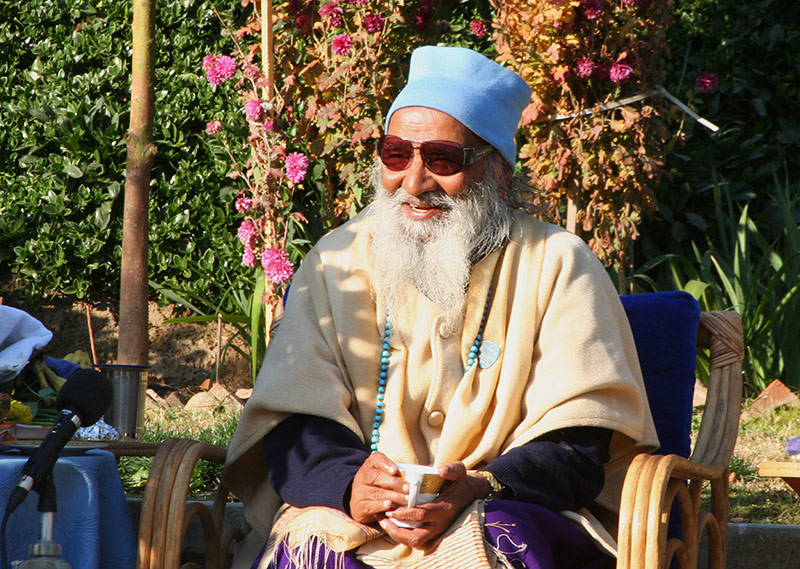
Now, Krishna replies. … [He reads aloud 8:3 in Sanskrit]. Krishna says that Brahm is akshar, it will never be destroyed. Arjun will like it. “If I can become that which is indestructible, Akshar Brahm, then it will be nice.” [Laughter] Krishna says, “That is my swabhav (nature), which is adhyatmam uchyatay (called spirit).” Swabhav is karm, action. Swabhav refers to Brahm, and Brahm will have his nature, or manifestation. What is the nature of a spider? To spread the thread. So Krishna says swabhav makes the manifestation, the thread. But you translate swabhav as habit. You say it is his swabhav that he drinks, smokes cigarettes and beedis (Indian cigarettes), that he likes white or black clothes, that he eats good or bad food, that he eats meat or garlic. But Krishna says, “My swabhav is to produce the inner being (adhyatmam) which will make a body, and that body is bhoot. The inner being will make bhoot, or objects, which means bodies and the five tattwas. They will appear. Visarg (the act of manifesting) means “I release all that so that the world should come into existence.”
Param Brahm has no meaning. How can you say this to a human being, who wants to know through meaning? For him, there are just words and meanings. Many times I have said, “Look, words were never there when you were a child. So why is meaning essential?” But we are not competent. Our system is made such that from the time we were children we had to learn something, and we know the power was there. Our parents knew it. The meaning of Param Brahm is indestructible, so Krishna says it is indestructible. Indestructible cannot be anything which appears and dies. In this way, Krishna is leading Arjun’s attention, which is fixed on the destructible when he says, “I’ll not fight war. I’ll not do it because danger and death is involved.” Thus, Krishna says Brahm is indestructible.
He speaks of it as Existence, not existing forms. Existence is Satta. We know we exist, that even a flower is satta. It comes into manifestation and our eyes see it, so we know this flower is satta. But Satta is the Source, which has no form, no name. A human being is given imperfect understanding, so Krishna says, “I call adhyatma the consciousness of all beings.” Consciousness means “I know.” You have some idea that you know all beings. With what do you know all beings? Adhyatma. So adhyatma means the inner instrumentality, the ego-intellect-mind, with which you see the sun, moon, sky, and all forms, sentient and insentient. This became what you translate in English as the “spiritual.” You don’t know what spiritual is, so you say it is the soul, self, inner things, the divine ghost.
Krishna says, “Adhyatma is the consciousness of all beings who know “’I am.’” Each person knows “I am.” Arjun understands there are “all beings,” so Krishna has to say something that he can understand. He says “all beings,” and Arjun is quiet. So he continues, “Each one knows, ‘I am a form.’ God’s emanation of the forms is called visarg.” Emanation is again glory, expression. Visarg is God’s emanation, so man thinks God must be some form, and he has done something so that the world came into existence, that he must be like a spider who has made a net. But Brahm’s emanation means no emanation: it is he himself! This is what I will say. But it is written here, “God’s emanation of the form is called visarg.” Sarg and visarg. Sarg means sansar, the world. So then it is both, sankalp and vikalp (imagination functioning through opposites). The meaning of karm is the act of manifesting the whole world. There is that with which you see that the world is in manifestation, so there must be somebody who should say, “Who did it?” Krishna says, “I did tyag, I gave myself in such a way that it should become form, just like in the dream.” That I—or Krishna, the Chidakash (Space of Consciousness)—gives his form and forms to the dreamer. He makes himself a dreamer—and the dreamer was never there. So he says, “I made the whole world.” This is also called tyag. It is as if the very Self, or God, has given up, or renounced himself by manifesting forms as the world.
Now you can check: neither you know the Self, nor do you know God. So how would you know how God gave himself, how the Self gave himself as his expression and became the world? You hear it, but you have no ability to question. At least she has read this and wants to know. I’ll ask Madhuri what she has come to know.
So now, verse four. “The forms which eventually perish are called adhibhoot.” This you can understand. You can know it. “The knowledge or awareness with which every being maintains his existence in time and space is called adhidaiv.” This also you can know. Your knowledge, your awareness, is in time and space. But knowledge knows time and space. “This is divine knowledge.” It is called subtler, divine knowledge, which again creates confusion, because then you think divine means, “If I become divine, then my job will be done. So can you give me some means by which my mind should become divine?” We give that also. [Laughter] [He continues to read] “This is divine knowledge, with which one can know the whole world as one.” He wants to say that if you attain divine knowledge, you will say “I alone am everything.” Arjun will again be confused. “How is it that I alone am Duryodhan [Arjun’s adversary]? And I alone am the earth?” He again is quiet. Whereas Krishna is saying there is no difference between “I alone am” and the world. It is only one reality. So he is leading the attention towards That, towards the whole world as one.
. . . .
Swamiji: The questions and answers are between Arjun and Krishna. Krishna wants to let Arjun transcend the ego-intellect-mind personality—whatever remains is the Self. This is realized by a human being like all of you with the intelligence to know, “Yes, if that remains and that is my Source, why should I keep clinging to Arjun and his bow and arrow, his ideas of relations and not relations, his ideas of death and birth?” Then you will get the benefit of the teachings.
Madhuri: What you say after all this is that even now the Knower is the one whom you identify as your body person, with the name Arjun. Having known this, you can perform your duty as a warrior and fight.
Swamiji: Yes, yes. That means that Krishna has told him that suppose you are there as a person, then why are you afraid of performing your duties?
Madhuri: Then you know you are the Self, and at the same time you are a person. The Self has become Arjun, in a sense.
Swamiji: Yes. That means it is the Self’s movie. Arjun is not performing, it is the Self performing. So Krishna says, “Look, I am doing all the work.” It is the Self doing it. The Self is giving light to your eyes and audition to your ears. The Self is giving action. The Self is making the body born. So it is Self’s movie. The realized one will know this. Then he will not hate birth, death, relations, this or that. He will say, “Well, look, it is like this.” Thank you. God bless you.
Madhuri: Thank you, Swamiji—very much. [Applause]
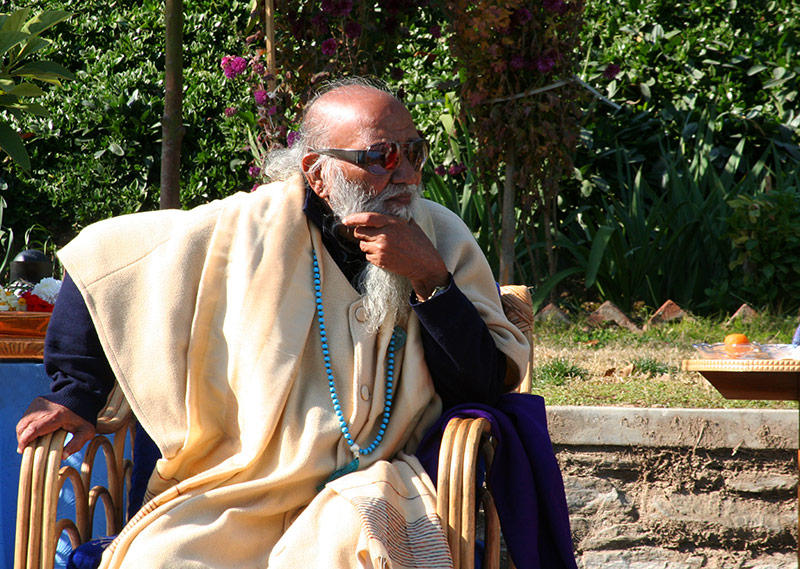
Vinamrita: Listening to you, I get absorbed in your words and what you say. I’m absorbed in that Bliss, knowing it. But then there comes, very fast, “Oh, I am understanding.” I feel in that moment everything is lost, and I get very uneasy and unnerved. I feel somehow I need to be able to perpetuate that absorption and not…
Swamiji: That is the mechanism, so for that you have to cultivate patience. You are driving and you forgot the wheel, so you go a hundred miles opposite to where you were going. Somebody says, “Well, look, you forgot. Now drive again.” With patience you again drive, you do not get frustrated. Then again you forget on the way. There are many forks in the road, and you say, “Well, I forgot again.” The man will say, “Continue driving till you reach the goal.” That is what human beings are meant to do. Continue meditating until the gyan (knowledge) becomes perfect on the level of your own waking state, which means the waking state should not remain as the waking state.
Your waking state was still there when you were saying that as long as I was speaking, you were absorbed. I withdrew your waking state, but not by snatching it. I talked in such a way that you got connected to your Self. When again you came into the body, you again became the ego-intellect-mind. The Self is sitting in the middle of the cavity of your heart. It has not been involved, it is always there. He is knowing that you forgot, and he is knowing that he knew. That is where the Self is Pure Free Forever.
We hear this. It is your side that somehow you have to examine or analyze it and be there. I have given you the whole map—driving is your job. It is not that you become unhappy so the next moment you can become happy. … You are doing it all, but I am kind of your polar star. At least somehow you came to know this. That gives me a sense of satisfaction with your participation. Otherwise, my talk is all useless. I will be maun. You’ll not even be able to meditate if I don’t talk. [Laughter] But I never say such things, because it is not really me doing. By letting you be convinced that you have the same Me as I have, it gives you a sense, on the level of the mind, that it is possible. When you see it is possible, then you will not be unhappy. You’ll have patience, because you never die. That’s all. Why do you worry that it should be right now? You just never die!
In your understanding is fixed that “I am getting old and I’ll die, therefore as long as I’m with Guruji I must get it!” It’s not that it’s being with Guruji; I’ve given you the technique. Whether you are there or not, you will do well. But do that which I have told you: Space is your reality! You should say Space is your I, but your mind says, “I am this.” I say, “Well, look, your mind is exposed when on your birthday you came to know that even your body was not born. Then why is your mind born? If to that I which is not born you say, ‘I am the body,’ it is wrong.” Then again you will be able to understand, “Ah, I have come to know!” That I is your Self. Thank you. God bless you. …
You have heard me, and you became that aware person who is eating/non-eating, who is seeing/non-seeing, who is hearing/non-hearing, who is walking/non-walking, who is bound and not bound, who is free and not free, who is zero and not zero, who is all and who is not all. That Being which is free does not fall in any category of the description of the body, in books or by the tongue. Thank you very much everyone. [Applause]
